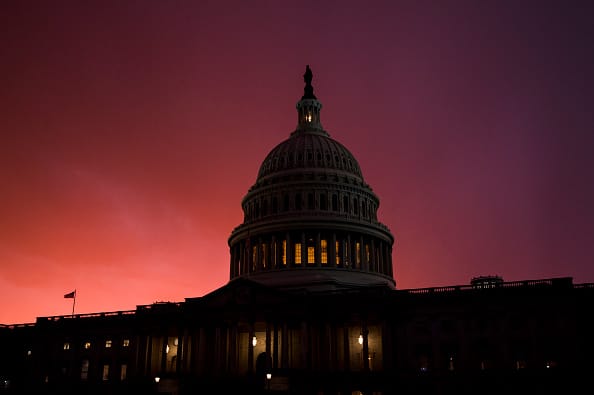Bill Clark | CQ-Roll Call, Inc. | Getty Images
“If we are going to get another round of stimulus, I can’t imagine that won’t be included in it,” said Michael Strain, director of economic policy studies at right-leaning think tank American Enterprise Institute, of a new weekly subsidy.
Strain added, however, that he thinks “it’s far from certain we will get another round.”
No sign of momentum
Senate Majority Leader Mitch McConnell, R-Ky.
Samuel Corum | Getty Images News | Getty Images
It has been nine months since President Donald Trump signed the $2.2 trillion CARES Act, the last piece of relief legislation passed by Congress.
Senate Majority Leader Mitch McConnell, R-Ky., said after the election a few weeks ago that reaching a stimulus deal is “job one” for the Senate.
Job growth is slowing at a time when long-term unemployment is ballooning and state officials are re-imposing some business restrictions to curb rising coronavirus infections.
Good luck making that go very far in many areas across the country.
Mark Hamrick
senior economic analyst at Bankrate
But Democrats and Republicans appear firmly entrenched in their respective negotiating positions.
McConnell wants to pass a targeted bill with a total price tag near $500 billion, while House Speaker Nancy Pelosi is aiming for a broader package north of roughly $2 trillion. President-elect Joe Biden has called on Congress to pass a bill before his inauguration in January and has publicly sided with Democrats on the overall size of a package.
Spokespeople for Biden, McConnell and Pelosi didn’t return a request for comment for this story.
“I don’t think there’s any sign of visible momentum,” said Mark Hamrick, a senior economic analyst at Bankrate. “It’s one example after another of Lucy moving the football before Charlie Brown goes to kick it.”
House Speaker Nancy Pelosi, D-Calif.
Drew Angerer | Getty Images News | Getty Images
Some are hoping that relief measures get attached to a spending bill that Congress must pass by Dec. 11 to avert a government shutdown.
“The most likely thing to move will be that budget [legislation],” said Andrew Stettner, a senior fellow and unemployment expert at the Century Foundation, a progressive think tank.
$600 unemployment boost
Absent a federal enhancement, unemployment benefits generally replace about half of workers’ lost wages, up to a dollar cap, which varies by state.
States paid $318 a week (almost $1,300 a month) in unemployment benefits to the average person in October, according to the Labor Department. Some get much less.
“Good luck making that go very far in many areas across the country,” Hamrick said.
An improving economy may change that dynamic, though, and lead such a subsidy to create a disincentive to find work among the unemployed, Strain said. Republicans are more likely to approve a weekly boost in the range of $250 to $400, he said.
That would be in line with prior policies from the Trump White House.
The president authorized a $300 weekly boost via an executive program, Lost Wages Assistance, created in early August. It paid up to six weeks of benefits using federal disaster-relief funds, though hundreds of thousands (largely the lowest earners) were ineligible. Treasury Secretary Steven Mnuchin offered a $400-a-week compromise during subsequent negotiations in October.
But $400 is likely to be the minimum ask for Democrats, who have backed a second $600 weekly enhancement in any new relief package, according to Hamrick.
“Compromise can take any number of different paths,” he said. “Unfortunately for the economy and the political world, we’re sort of in a pandemic purgatory.”
